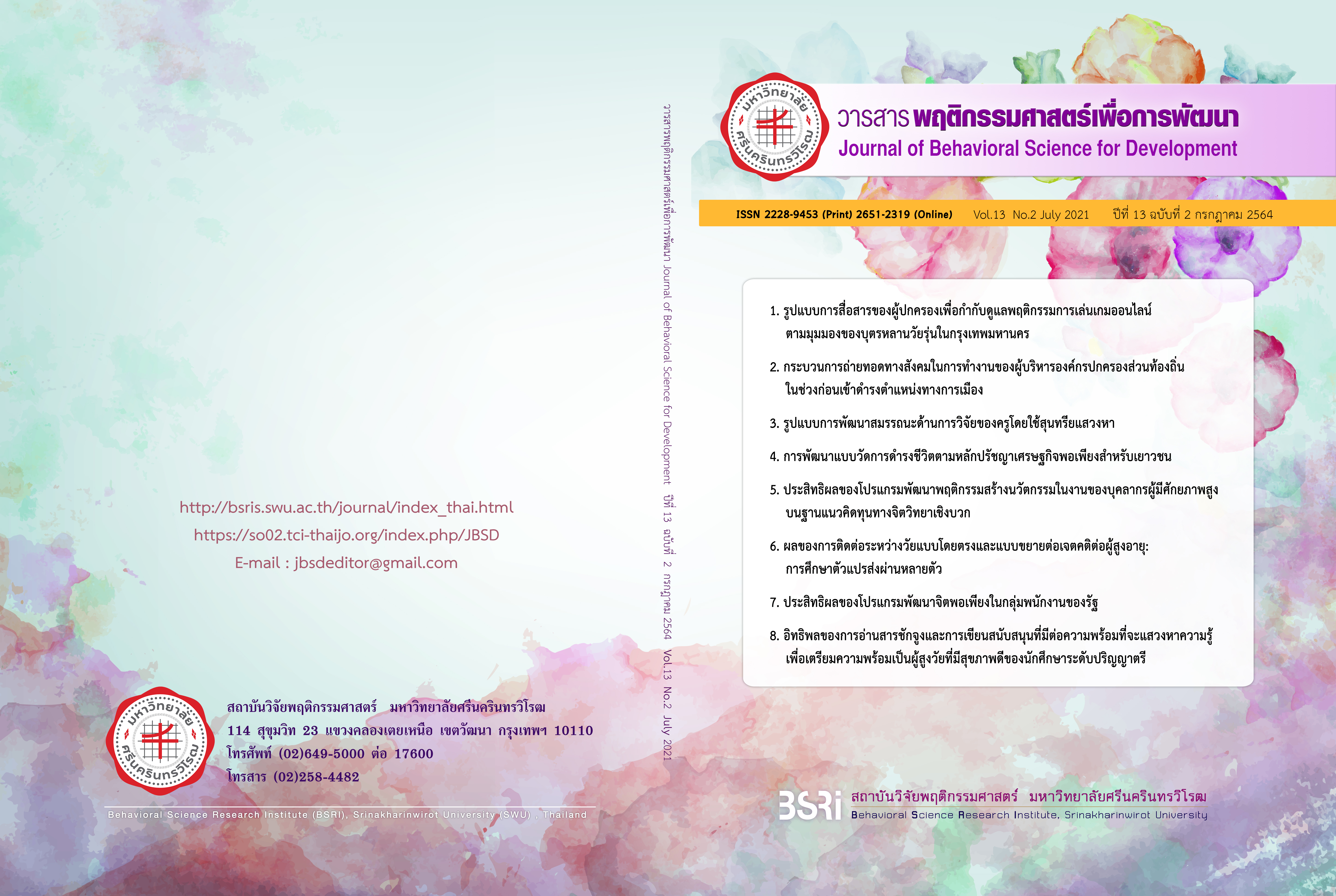Effectiveness of the Psychological Sufficiency Development Program for State Employees
Keywords:
Psychological Sufficiency, Psychological Sufficiency Development Program, State Employees, Experiential LearningAbstract
The purpose of this study was to assess the effectiveness of the psychological sufficiency development program for the staff of the College of Dramatic Arts of the Bunditpatanasilpa Institute. This research employed a quasi-experimental design. Forty state employees were equally divided into experimental and control groups. The achievement motivation test and the psychological sufficiency test were used in the pre-test. After the program, the psychological sufficiency test was used both as an immediate post-test and a one-month follow-up questionnaire. The results showed that the post-test scores of the experimental group were higher than the pre-test scores of both the experimental group and control group with statistical significance. In addition, the post-test scores of the experimental group were slightly lower than the one-month follow-up scores of the experimental group but was higher than the one-month follow-up scores of the control group. The results confirms that the program can improve psychological sufficiency in the state employees. Therefore, it is advisable to use the study model for long-term psychological sufficiency development to maintain permanent psychological sufficiency.
References
Amorntham, U. (2006). Philosophy of Sufficiency Economy of the King. Saengdao printing.
Boonma, H. (2018) Organizational Culture Promoted by Bunditpatanasilpa Institute, Ministry of Culture. Department of Education Administration, Sripatum University. Knowledge Management Potential Development Project Research and Innovation Department Office of the President Bunditpatanasilpa Institute, 2013.
Chaithapap, C. (2008). The mentality according to the philosophy of sufficiency economy. The organization of sufficiency and happiness in the work, the support of the organization and good organizational membership behavior, case study Department of Corrections, Academic Resources of Songkla University, Year 28, Issue 2 April - June 2013
Department of Community Development, Ministry of Interior. (2006). Sufficiency Economy in the Community Household income Office of Community Enterprise Promotion Department of Community Development, Department of Community Development.
Department of Labor. (1972). Handbook for analyzing jobs. Printing Office.
Duangwiset, B., & Sittisomboon, M. (2017). The Development an Instructional Model by Using Experiential Learning Enhancing Life Skills for Student Teachers in Rajabhat University. The Golden Teak: Humanity and Social Science Journal, 23(1), 67-84.
Eaka, S. (2017) Teacher Qualifications 8 Things that are necessary for Thai education in the 21st century. Retrived from https://web.facebook.com/Suthat-Eka-Sutat-Eaka-1168898606519214/
George, D., & Mallery, P. (2010). SPSS for Windows Step by Step: A Simple Guide and Reference 17.0 update. Allyn & Bacon.
Intasuwan, P. (2002). Analysis of Multivariate Variance. B.E. Development.
Intawong, N. (2013). Employee Welfare Requirements, Rajamangala University of Technology,East Bang Phra Campus Chonburi Province. Master of Public Administration, Public and Private Management Program, Graduate School of Public Administration, Burapha University.
Kaewjaranai, P. (2015) Debt conditions of local administrative organizations employees: A case study of Laem Chabang city municipality, Sriracha district, Chonburi Province, Master of Political Science program Economics Politics and Management Faculty of Political Science and Law, Burapha University.
Khammungkul, J. (2019.) A causal relationship model of adaptive behavior in learning. Journal of Behavioral Science, 25(1), 1-24.
Kolb, D. A. (1984). Experiential Learning. A Simon & Schuster Company.
Manion, J. (2003). Joy at Work: Creating a Positive Work Place. Journal of Nursing Administration, 33(12), 652-659.
Naiyaphat, O. (2005). Quantitative and qualitative research methods in behavioral sciences and social sciences, Pimlak, Srinakharinwirot University
Orawongsuphathat, C., & Pimthong, S. (2018) Effectiveness of Integrated Psychological Program to Promote Organizational Loyalty among Generation Y Telecommunications Engineers Working for Thai Public Enterprise, Journal of Industrial Education, 17(1), 120-128.
Phanthumnawin, D. (1995). Ethics of work. Thai Wattana Panich Publishing.
Phanthumnawin, D. (2004). Articles accompanying the lecture titled Research Guidelines To an index of mental immunity. In the meeting for the development of researchers under the project to promote research and development of multiple mental indexes according to the philosophy of sufficiency economy and a project to promote research and development of the mind with fairy tales (1st time). (Nor. Jor., 1-23). Bangkok.
Phanthumnawin, D. (2008). Research to develop a multi-level psychometric instrument, in the context of the philosophy of sufficiency economy, Bangkok.
Ponlunhit, J., Nualpang, K., & Angganapattarakajorn, V. (2018) The Effects of Using Experiential Learning Management on Mathematical Problem Solving Skills and Connection Skills of Mathayomsuksa 3 Students. Academic Journal of Curriculum and Instruction Sakon Nakhon Rajabhat University.
Sakmanee, B. (1989). Characteristic mental enhancement for the development of working behavior of government officials (Doctoral thesis). Srinakharinwirot University Prasarnmit.
Sirirak, J. (2012). Characteristics of school, family and psychological sufficiency relate to responsible behavior of junior high school students, Master's thesis. Research field Applied behavioral science Graduate School Srinakharinwirot University.
Srirath, D. (2017). Quality of life of personnel working for support units in Burapha University, Master of Public Administration Public and Private Management Program, Graduate School of Public Administration, Burapha University.
Suapumee, N., Naksrisang, W., & Singhasem, P. (2017). Management of Experiential Learning in Nursing Education. Nursing Journal of The Ministry of Public Health, 27(1), 12-21.
Udomrat, P. (2004). Cost-effective quality: Develop the work to develop good people in a cost-effective way. Songkhla Nakarin University.
Wiyaporn, P. (2016) The Solving Process of the financial liabities problems of teacher and education personnel. Graduate School, Silpakorn University.
Wongpinpet, V. (2015). Relationship between Sufficiency and Intellectual Consumption Behavior of Grade 6 students of a school in Muang District, Chiang Mai Province. Journal of Academic Far Eastern University, 9(2-4), 164-174.
Downloads
Published
How to Cite
Issue
Section
License
Copyright (c) 2021 Journal of Behavioral Science for Development

This work is licensed under a Creative Commons Attribution-NonCommercial-NoDerivatives 4.0 International License.



